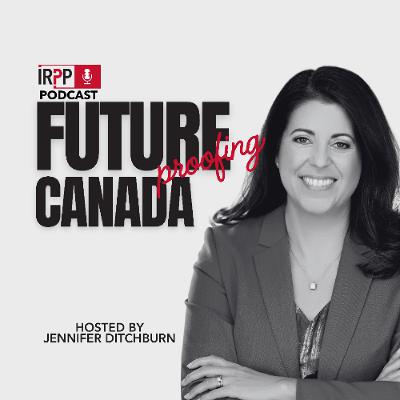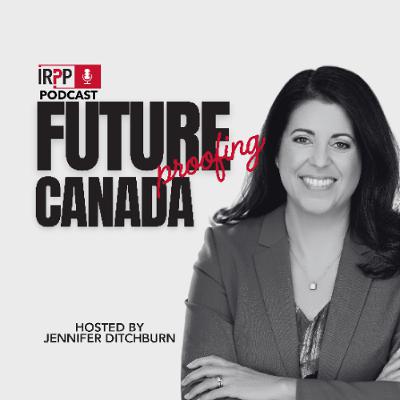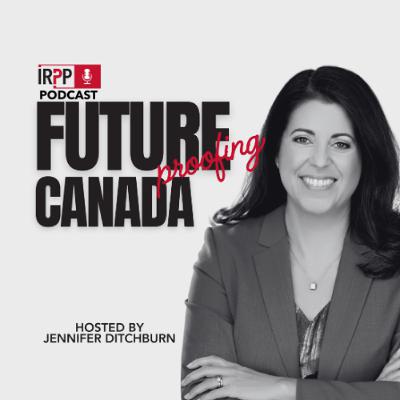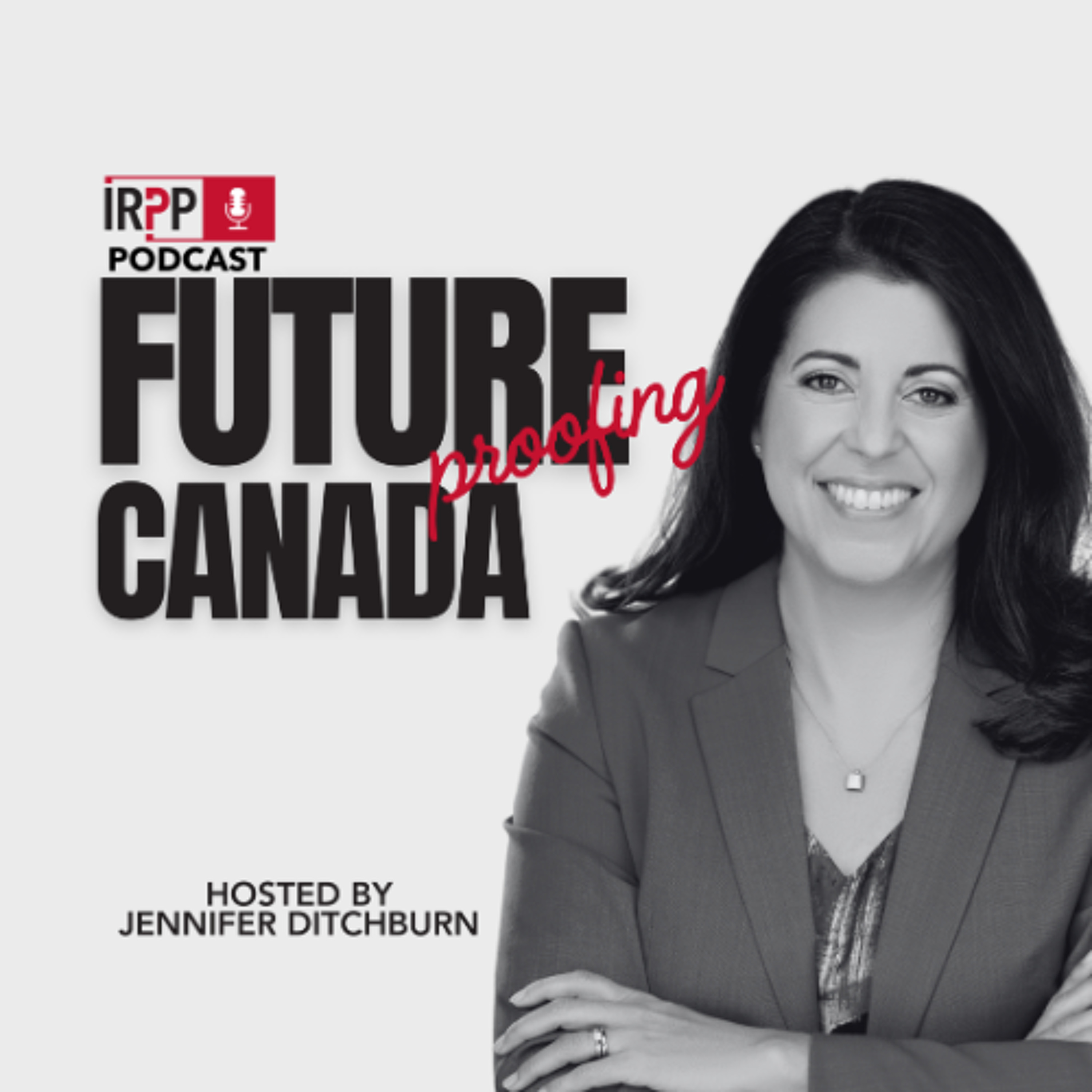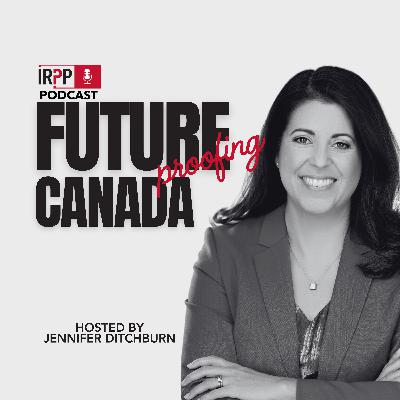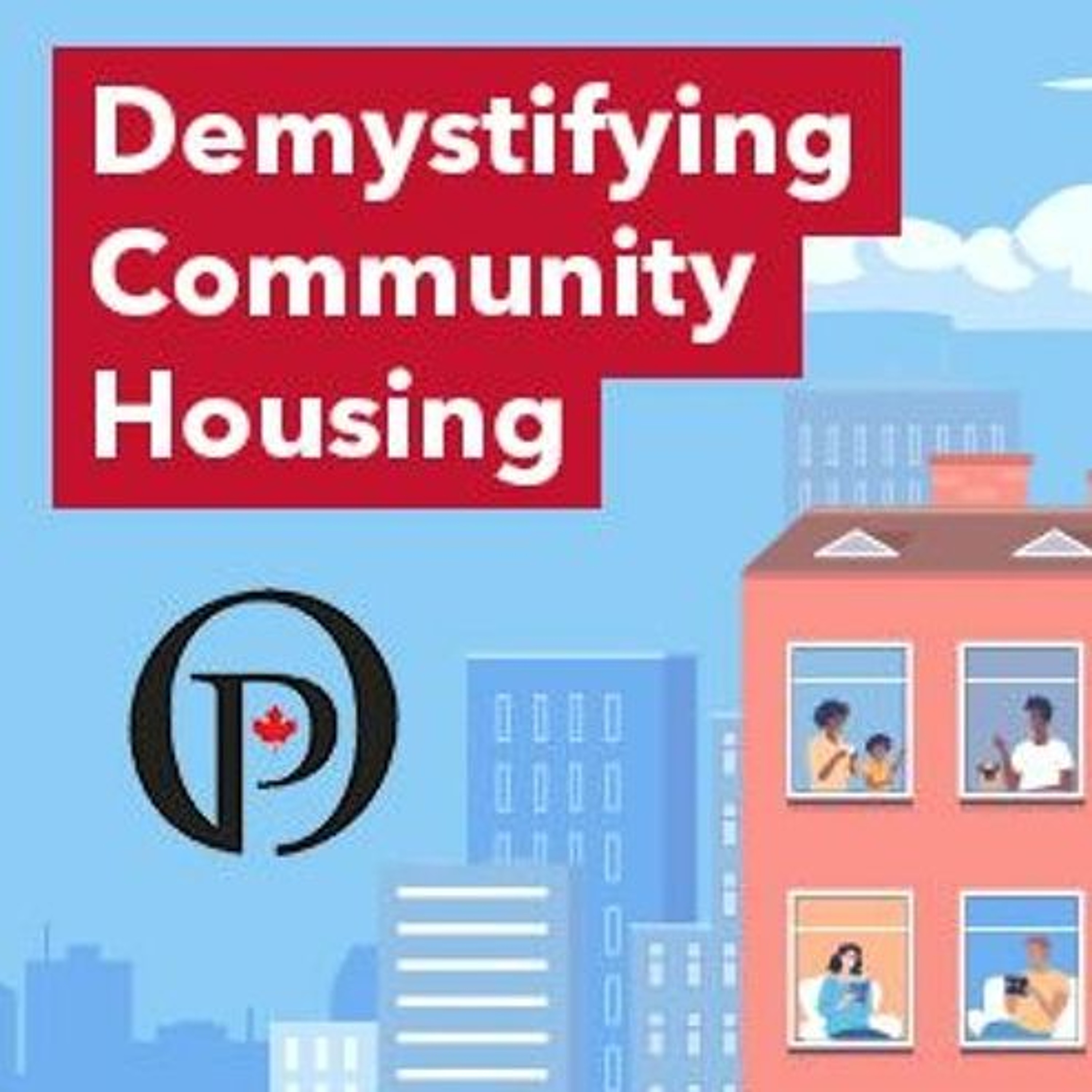Discover Futureproofing Canada
Futureproofing Canada

Futureproofing Canada
Author: IRPP
Subscribed: 211Played: 4,028Subscribe
Share
© All rights reserved
Description
Canadians are living through uncertain times. Our country faces interconnected challenges including a new geopolitical world order, economic headwinds, climate change, technological disruptions, shifting demographics and deepening inequality.
Futureproofing Canada brings you conversations with the people who are thinking boldly about how to solve these challenges. Each biweekly episode features a frank, in-depth discussion between IRPP president and CEO Jennifer Ditchburn and the leaders who envision a Canada that’s confident and ready to seize opportunities.
Futureproofing Canada brings you conversations with the people who are thinking boldly about how to solve these challenges. Each biweekly episode features a frank, in-depth discussion between IRPP president and CEO Jennifer Ditchburn and the leaders who envision a Canada that’s confident and ready to seize opportunities.
215 Episodes
Reverse
In this episode of Futureproofing Canada, Jennifer Ditchburn speaks with Pari Johnston, President and CEO of Colleges and Institutes Canada, about why the country’s workforce strategy must include its colleges.
Johnston shares how colleges are powering applied research and training across the country, from AI labs to smart farms, while advancing Indigenous economic reconciliation and helping communities navigate economic transition. She also discusses the ripple effects of recent international-student policy changes and what they reveal about Canada’s broader labour and demographic challenges.
Tune in to hear Johnston’s insights on how colleges can power Canada’s future prosperity.
This week’s episode is a recording of a panel Jennifer moderated at the IRPP’s recent conference on industrial policy.
The panel featured Patricia Goff, professor in the Department of Political Science at Wilfrid Laurier University and at the Balsillie School of International Affairs; Matthew Holmes, executive vice-president (international) and chief of public policy for the Canadian Chamber of Commerce; and Steve Verheul, a member of the Prime Minister’s Council on Canada-U.S. relations and Canada’s former chief trade negotiator.
Their conversation touched on topics including the state of Canada-U.S. trade negotiations, opportunities for enhancing trade in Europe, Latin America and other regions, and how to help Canadian businesses expand their horizons outside the hemisphere.
Tune in to hear how strategic industrial policy can help Canada diversify both its trading partners and its exports.
In this episode, RJ Simpson, Premier of the Northwest Territories, joins us for a conversation about how the North can help shape Canada’s economic and security future.
Simpson highlights the region’s wealth of critical minerals and the importance of projects like the proposed Arctic Security Corridor to unlock new opportunities. He underscores the need for climate-resilient infrastructure, local workforce training, and strong partnerships with Indigenous governments to ensure development is both sustainable and inclusive.
Tune in to hear his vision for the North and what it means for the future of the country.
In this episode, Jennifer is joined by David Chaundy, President and CEO of the Atlantic Economic Council, for a conversation about the economic transformation of Atlantic Canada and what lies ahead for the region.
Chaundy reflects on more than two decades of industrial change, from the decline of traditional sectors to the rise of bioscience, aerospace, and offshore energy. He highlights the challenges posed by tariffs and labour shortages, as well as the opportunities presented by immigration, interprovincial trade, and strategic investments in energy, transportation, and defence.
Chaundy outlines a vision for Atlantic Canada that links economic resilience to national priorities, showing how the region can play a critical role in Canada’s long-term prosperity.
Why Canada Needs a Rural Lens in Decision-Making by IRPP
What is “mission-driven” government, and can it work in Canada by IRPP
In this episode, Jennifer is joined by Zita Cobb, the CEO of Shorefast, an organisation that promotes economic self-determination and strategies for strengthening local economies in sustainable ways.
Drawing on her experience revitalizing Fogo Island, Cobb shares her vision for asset-based community development, an approach that puts local knowledge, culture, and infrastructure at the heart of sustainable growth. She argues that Canada needs a more balanced model of development, one that aligns government, market forces, and community action to serve the long-term public good.
Together they explore the role of banking, tourism, and regional connectivity in building economic resilience. Cobb calls for a national strategy rooted in place, purpose, and long-term thinking to ensure no community is left behind in the country’s economic future.
Indigenous businesses are now being launched at up to nine times the rate of non-Indigenous businesses.
In this episode of Futureproofing Canada, Jennifer is joined by Tabatha Bull, President and CEO of the Canadian Council for Indigenous Business, for a conversation about the growing momentum of Indigenous-led businesses in Canada. Together they talk about the unique challenges these businesses face, including barriers to capital, the impact of federal policies like the Indian Act, and the disproportionate effects of tariffs.
Bull outlines how Canada can better support Indigenous business growth and economic reconciliation by removing systemic obstacles and making space for Indigenous leadership at every level of decision-making.
In this episode, Jennifer is joined by Natan Obed, President of Inuit Tapiriit Kanatami, for a wide-ranging conversation on Inuit self-determination, infrastructure, and Canada’s future in the Arctic.
Originally from Nunatsiavut, Obed has become one of the leading voices advocating for Inuit rights and equity within Canadian society. He shares his journey from studying at Tufts University to leading national efforts for policy change, and highlights the urgent need for infrastructure investments, from deep-water ports to clean energy projects.
With a focus on practical solutions and long-term collaboration, he calls for Canada to move beyond symbolic gestures and into an era of respectful, results-driven partnership with Inuit communities.
Canada’s Cities Are Doing Too Much With Too Little — Here’s Why That Matters by IRPP
Sault Ste. Marie, Ontario, is an important industrial centre best known for its steel industry. But that industry is currently being threatened by the tariffs on steel and aluminium announced by the Trump administration.
Our guest today is Matthew Shoemaker, Mayor of Sault Ste. Marie. Mayor Shoemaker is lobbying hard across the border to change a situation he can't make any sense of, but he also has ideas for what Canadian governments can do to help the city weather the storm and come out even stronger.
Together we discuss the challenges posed by U.S. tariffs and global trade tensions. He outlines a vision for the city’s future that includes transitioning to greener steel production, expanding immigration to address labour needs, investing in infrastructure and greater support from federal and provincial partners.
In our first episode, Jennifer is joined by Ranj Pillai, Premier of Yukon, for a conversation about what it means to build economic resilience in the North.
Premier Pillai speaks about Yukon’s response to global tensions and economic uncertainty, emphasizing infrastructure investment to support major investments in critical mineral projects. He underscores the importance of long-term planning, strong partnerships with Indigenous peoples and maintaining Arctic sovereignty. And, with Yukon’s economy performing well, he also highlights the creation of the Canadian Institute for Arctic Security to counter foreign interference and strengthen defence in the North.
This week, we’re once again brining you the audio from one of our most recent event. This time it’s from a webinar on Canada-U.S. relations that we held on March 5, 2025.
The second Trump administration is turning into an unsettling roller-coaster ride, and Canadians can’t seem to get off. Every day seems to bring a new set of goalposts, demands and threats.
In this webinar moderated by IRPP president and CEO Jennifer Ditchburn, IRPP Board members Jean Charest, Janice Charette, Ian Brodie and Christopher Sands unpacked the challenges facing Canadian governments in these tumultuous times and discussed what it will take to build economic and social resilience for the long haul.
A video version of the event is also available on our website at irpp.org
As a new U.S. administration keeps threatening to impose tariffs on Canadian exports, the IRPP hosted a panel discussion on how to address the intersecting affordability and climate crises.
Hosted in partnership with the Affordability Action Council, the panel featured Tyler Meredith, a former economic policy adviser to the Liberal government, Kathleen Monk, former director of communications to NDP leader Jack Layton, Karen Restoule, vice-president of Toronto-based Crestview Strategy and senior fellow at Macdonald-Laurier Institute and was moderated by Jennifer Ditchburn.
The panel focused on how to protect households from the rising cost of living, how to minimize the impacts of extreme weather events and how to keep affordable food on the table. This podcast is the audio from that discussion.
On this last episode in this series, our co-hosts Hanan Ali and Natasha Mhuriro talked to four guests. Djaka Blais, Executive Director of Hogan’s Alley Society; Robert Byers, President & C-E-O of Namerind Housing Corporation; Joshua Evans, Associate Professor at the University of Alberta. and Franz Bernhardt, Postdoctoral Researcher at Aalborg University, Denmark.
We spend time thinking about and imagining alternative models of community housing. How could or should Canada’s community housing sector look differently in the future? What are some good examples of innovative housing projects and practices from across the country – and around the world? What lessons can we learn?
The production of the podcast series is led by Dr. Yushu Zhu and Dr. Meg Holden at Simon Fraser University as part of the Community Housing Canada project and the Housing Inequality in Canada project, in partnership with IRPP. Student researchers include Hanan Ali, Natasha Mhuriro, Pok Man Tong, and Khoa Vo. This podcast has been a dedicated collaboration, with production assistance by Ricardo Montrose, Cléa Desjardins and Luc Moulaison at IRPP, and audio producer Jackie G. Karen Sawatzky contributes to script editing for this episode. If you like what you heard and you want to know more about the Institute for Research on Public Policy, head over to https://irpp.org/.
Additional resources:
Hogen’s Alley Society - A Black-led non-profit organization dedicated to advancing the social, political, economic, and cultural well-being of people of African descent in Metro Vancouver.
Namerind Housing Corporation - An Indigenous-led housing provider and social enterprise.
Aboriginal Housing Management Association (AHMA) - An umbrella organization composed of 41 Members that are each Indigenous Housing providers. The first Indigenous Housing Authority in Canada and only the second in the world.
Ontario Aboriginal Housing Services - A non-profit housing provider with a focus on the Indigenous community.
Housing Boom in Gateway Cities – Book written by David Ley, 2023. Utilising a comparative approach in five gateway cities, the author provides an understanding of the politics of booms, lifting the debate beyond narrow housing and real estate studies.
Policy fact sheet: National Building Fund, Denmark. European Construction Sector Observatory. 2019.
The resilience of social rental housing in the United Kingdom, Sweden and Denmark: How institutions matter. Timothy Blackwell & Bo Bengtsson. Housing Studies. 2023. 38:2, 269-289.
In this episode of Demystifying Community Housing, we hear from Alex Hemingway, Christina Maes Nino and Steve Pomeroy, on the various challenges facing the community housing sector and how to bolster its resilience.
Additional resources:
• Canadian Housing Evidence Collaborative (CHEC), a network of more than 30 academics and more than 50 practice partners representing policymakers, housing providers and equity-seeking groups, to accelerate evidence-based solutions that advance Canada’s National Housing Strategy
• Business Transformation: Promising Practices for Social and Affordable Housing in Canada. 2015. Published by Housing Partnership Canada.
• The Community Housing Transformation Centre, a network of organizations that represent and serve the needs of Canada’s community housing sector. The centre provides access to tools, financial resources and best practices to support the growth, transformation and resilience of community housing.
Funding:
This podcast series receives funding from the Canada Social Sciences and Humanities Research Council Partnership Grant for The Community Housing project [430-2021-00887] and the Insight Development Grant for the Housing Inequality project [890-2018-1013].
In this episode of Demystifying Community Housing, Hanan Ali and Natasha speak with Damian Collins, Professor of Earth & Atmospheric Sciences at the University of Alberta and Director of the Community Housing Canada Research Partnership, Marika Albert, the Policy Director of B.C. Non-Profit Housing Association and Alex Hemingway a Senior Economist and Public Finance Policy Analyst at the Canadian Centre for Policy Alternative’s B.C. Office. Together, they discuss what roles community housing can play in addressing the housing crisis, particularly in supporting tenant well-being, as Canada’s housing crisis wears on.
Additional resources:
• Office of the Federal Housing Advocate, established under the National Housing Strategy
• The Globe and Mail’s housing section covers the full spectrum of housing issues from a wide variety of perspectives and communities across Canada
• Stories About Here, a CBC Gem and Youtube documentary
• The Non-Capitalist Solution to the Housing Crisis, a video from Uytae Lee’s popular urbanist Youtube channel: About Here
• Opening Doors: Unlocking Housing Supply for Affordability, final report of the Canada-British Columbia Expert Panel on the Future of Housing Supply and Affordability
Funding:
This podcast series receives funding from the Canada Social Sciences and Humanities Research Council Partnership Grant for The Community Housing project [430-2021-00887] and the Insight Development Grant for the Housing Inequality project [890-2018-1013].
In this episode of Demystifying Community Housing we hear from AnaLori Smith, Pam Gill and Rita Wong about what it’s like to live in community housing. We’ll also talk to non-profit housing practitioners Marika Albert and William Azaroff about the challenges of operating community housing and supporting the well-being of their tenants.
In this episode of Demystifying Community Housing, co-hosts Hanan Ali and Natasha Mhuriro speak with Rebecca Schiff, dean of the Faculty of Human Health Sciences at the University of Northern British Columbia; Ray Sullivan, executive director of the Canadian Housing and Renewal Association; and David Hulchanski, a professor in the Faculty of Social Work and the Graduate Program in Planning in the Department of Geography at the University of Toronto. Together they discuss what community housing means, who it serves or should serve, and how to pave the path forward for resilient community housing.
SHOW NOTES
The production of the podcast series is led by Dr. Yushu Zhu and Dr. Meg Holden at Simon Fraser University as part of the Community Housing Canada project and the Housing Inequality in Canada project, in partnership with IRPP. Student researchers include Hanan Ali, Natasha Mhuriro, Pok Man Tong, and Khoa Vo. This podcast has received production support and assistance from Cléa Desjardins, Ricardo Montrose and Luc Moulaison at IRPP, and audio producer Jackie G. If you like what you heard and you want to know more about the Institute for Research on Public Policy, head over to https://irpp.org/.
Additional resources:
Where Are All My Relations? Stories of Indigenous Homelessness in B.C. is an eleven-episode series that explores Indigenous homelessness rooted in Indigenous worldviews and experiences. The documentary can be viewed via Indigenous-led Solutions to Indigenous Homelessness — Lu’ma Group of Companies (lnhs.ca). This film was funded by the Province of BC. The videos were produced by Little Bird Media, an Indigenous-led firm based in Vernon, B.C., including Lu’ma Native Housing Society. The project was stewarded by leaders from various Indigenous organizations. The documentary is licensed under a CC BY-NC-ND license.
PUSH (2019), a documentary film investigating housing financialization
Housing Assessment Resource Tools (HART) at the University of British Columbia
Canadian Housing Evidence Collaborative (CHEC) at McMaster University
At Home in the North, partnership project for Northern housing security and homes
Neighbourhood Change Research Partnership based at the University of Toronto
Canadian Housing Renewal Association (CHRA) Economic Study: The Impact of Community Housing on Productivity
Hey Neighbour Collective (HNC) on community-building, social connectedness, and resilience in B.C.’s multi-unit housing communities.
Funding:
This podcast series receives funding from the Canada Social Sciences and Humanities Research Council Partnership Grant for The Community Housing project [430-2021-00887] and the Insight Development Grant for the Housing Inequality project [890-2018-1013].
Welcome to Demystifying Community Housing, a special series from the IRPP’s Policy Options Podcast, which explores the different facets of community housing and its role in addressing Canada’s housing crisis.
In this episode, we speak with Yushu Zhu and Meg Holden, professors of urban studies at Simon Fraser University, who are leading the production of this podcast series. Together we talk about their research on community housing, the reason they worked on this podcast and what listeners can expect.
SHOW NOTES
The production of the podcast series is led by Dr. Yushu Zhu and Dr. Meg Holden at Simon Fraser University as part of the Community Housing Canada project and the Housing Inequality in Canada project, with support from IRPP. Student researchers include Hanan Ali, Natasha Mhuriro, Pok Man Tong, and Khoa Vo. This podcast has been a dedicated collaboration, with production assistance by Cléa Desjardins, Ricardo Montrose, and Luc Moulaison at IRPP, and audio producer Jackie G. If you like what you heard and you want to know more about the Institute for Research on Public Policy, head over to https://irpp.org/.
Additional resources:
Community Housing Canada – Partners in Resilience: A research-practice partnership project aimed at increasing the sustainability and resiliency of the community housing sector. It is part of an independent, Canada-wide collaboration of academics and community partners: The Collaborative Housing Research Network (CHRN).
The neighbor spectrum in community housing: Pro-social, anti-social and asocial neighboring in Vancouver (Holden et al., 2024): This journal article presents focus group research with community housing residents in Vancouver, Canada, investigating the role, activities, and importance of neighboring to these individuals living in vulnerable situations. A commentary based on this research is published The Conversation: Higher density living is changing the way neighbouring works in Canada.
Housing vulnerability and well-being in the COVID-19 pandemic (Zhu et al., 2022): Drawing on a representative sample survey of B.C. adult residents, this report examines different aspects of housing situations and factors that may increase housing vulnerability or resilience during the pandemic.
Housing Vulnerability Reconsidered: Applications and Implications for Housing Research, Policy and Practice (Zhu et al., 2024): A special issue published at Housing, Theory and Society (academic journal). This issue presents research into what housing vulnerability means in different world regions, what structures and systems may be driving it, and the variety of experiences of housing vulnerability.
Funding:
This podcast series receives funding from the Canada Social Sciences and Humanities Research Council Partnership Grant for The Community Housing project [430-2021-00887] and the Insight Development Grant for the Housing Inequality project [890-2018-1013].


